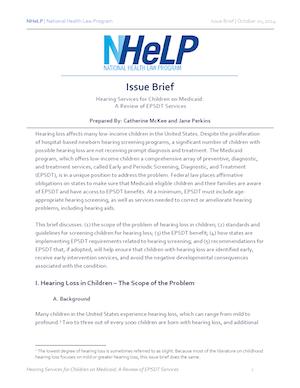By: Jane Perkins and Catherine McKee


Executive Summary
Hearing loss affects many low-income children in the United States. Despite the proliferation of hospital-based newborn hearing screening programs, a significant number of children with possible hearing loss are not receiving prompt diagnosis and treatment. The Medicaid program, which offers low-income children a comprehensive array of preventive, diagnostic, and treatment services, called Early and Periodic Screening, Diagnostic, and Treatment (EPSDT), is in a unique position to address the problem. This NHeLP issue brief discusses: (1) the scope of the problem of hearing loss in children; (2) standards and guidelines for screening children for hearing loss; (3) the EPSDT benefit; (4) how states are implementing EPSDT requirements related to hearing screening; and (5) recommendations for improving children’s access to hearing services through the EPSDT benefit.